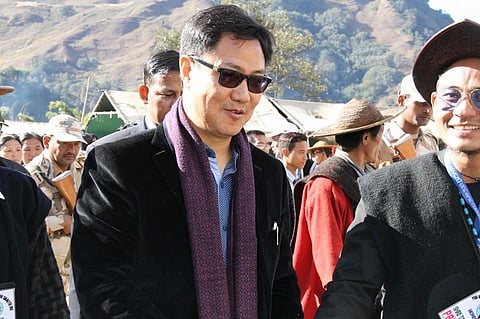

'Namma Metro Hindi Beda', a campaign against Hindi imposition, which was started in Bengaluru, has now gained the attention of the central government.
Union Minister of State for Home Affairs, Kiren Rijiju, on Friday, assured the Rajya Sabha that Hindi would not be imposed on those who don’t speak the language.
Rijiju’s statement is of significance as the protests against Hindi imposition gained momentum in Karnataka after the Twitter campaign ' Namma Metro Hindi Beda' managed to garner support from non-Hindi speaking states to come together to fight “Hindi imposition”.
“Hindi is the official language and all other Indian languages are national languages. There is no question of imposing one language over other languages,” Rijiju, who is in charge of the Department of Official Languages in the Central government told the Rajya Sabha.
The Union Minister was responding to a private member’s bill moved by B K Hariprasad of the Congress party who sought the inclusion of Tulu and Kodava languages in the list of official languages in the Eighth Schedule of the Constitution.
“Let me be clear. It is not a question of trying to impose Hindi. There is no question of discrimination among Indian languages. There is no special attempt to promote Hindi,” Rijiju said while adding that the three-language formula is already in existence and that the Central government is not going to stop any state to conduct its business in regional languages.
He said that the issue of language is sensitive, and any misrepresentation will lead to huge differences between states, and the centre in the country.
“We have not given preference to Hindi over other languages. We will ensure that no complications arise in the future because of the sensitivity of the subject,” Rijiju said.
“Hindi was made the official language at the Centre, taking into account the spirit of members of Parliament. It is not only Hindi but all other regional languages too, that have to be promoted,” Rijiju added.
Debating Rijiju’s statement, Hariprasad said that the reason he had passed the private member’s bill, was to protect Tulu and Kodava languages as the Central government has the “tendency to impose Hindi in south India, where most of the people don’t even know the language”.
“Only 4% people in Karnataka know Hindi. In south India, the money order form is in English and Hindi. The challans in banks are in English and Hindi, all Central government offices in south India are using only Hindi and English. The local languages such as Tamil, Kannada, Telugu or Malayalam should be also be included in these places if you want to follow the three-language policy. Why should these be excluded?” the Congress leader from Karnataka said.
Responding to BK Hariprasad’s bill, Rijiju told the Rajya Sabha that an official panel has been tasked with filing a report on inclusion of more languages in the Eighth Schedule of the Constitution.
The Eighth Schedule currently recognises 22 languages while cases are pending for 16 other languages to be included, and Tulu and Kodava are among them.
In the past two expert panels – the Pahwa Committee in 1996 and the Sitakanta Mohapatra Committee in 2003, could not conclusively form criteria to decide on the inclusion of other languages in the Eighth Schedule.
A third panel will be formed, which will be headed by an additional secretary rank officer with members from the Ministry of Human Resource Development, Ministry of Information and Broadcasting, Department of Personnel and Training, Central Institute of Indian Languages, Mysuru and the Sahitya Akademi.